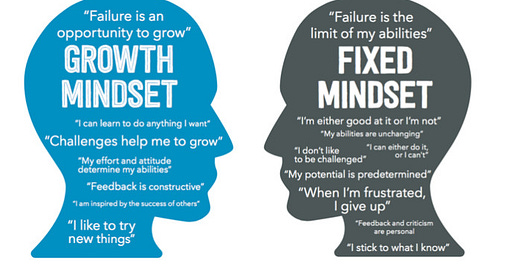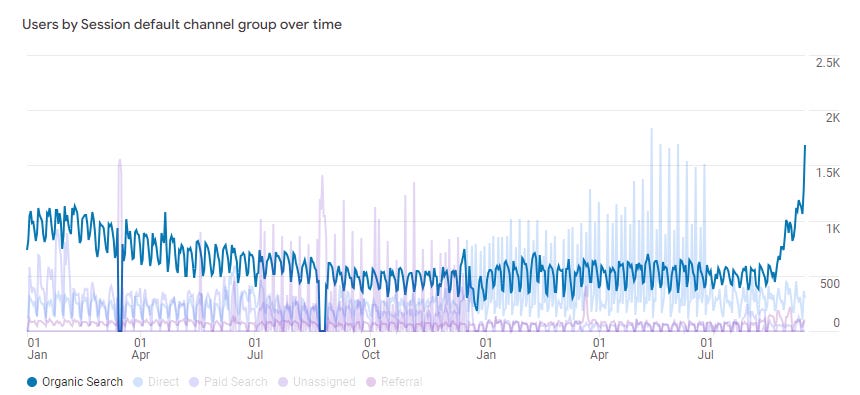This week’s newsletter is sponsored by the Digital PR agency Search Intelligence, which uses PR methods to grow a link portfolio and North Star Inbound, which is a recommended agency for penalty recovery. See their case studies linked in the newsletter.
This week’s recommended resources:
{sponsored} Check out Topcontent/AI, a tool for generating SEO articles, images and ideas in bulk. You'll get 5 free credits by using this link.
My book is $.99 on Kindle for at least the next month, grab it if you have not read it.
If you aren’t yet subscribed to Kevin Indig’s Growth Memo, you are missing out.
For the last five years, I have been a full-time growth consultant building SEO channels at some of the coolest companies. Throughout this time, I have met amazing growth leaders, brilliant marketers, and some very creative SEO geniuses.
Without a doubt, I can say that soft skills like the ability to adapt to changes, develop nontraditional solutions, and, most importantly, communicate effectively absolutely trump the hard skills of understanding technical processes underpinning SEO.
Soft skills win
In more than a few instances, I have seen product and growth managers with very limited SEO knowledge uncork better SEO results than SEO experts with a decade of knowledge and experience.
[SPONSORED by Search Intelligence]
This campaign landed massive organic links in Timeout, Express, and lots of other big outlets.
This is exactly how we’ve done it:
💡 Campaign name: Easiest European countries to gain citizenship
✅ We studied the latest Eurostat immigration data from 2009 to 2021.
✅ We wrote up an email report outlining our findings:
Sweden is the easiest, followed by Norway, and the Netherlands.
This campaign got us over 15 non-syndicated links, including massive ones such as Timeout, Express, and…
The difference is in mindset and soft skills. Product managers don’t need to be the greatest SEO geniuses to develop an SEO product roadmap if they truly understand their users. They need input from someone with SEO experience to guide them on specific SEO best practices, but otherwise, their customer empathy and product management tactics win the day.
On the complete opposite end of that extreme, I have seen SEO managers who can wax poetic about nuances in Google algorithms and share war stories about SEO discoveries. Still, they are entirely incapable of using those smarts to grow SEO revenue.
Fortunately for the effective and diligent product manager, there are easy ways to fill in those gaps in SEO knowledge. My entire consulting practice revolves around working with these PMs and growth leaders to make better decisions and build efficient roadmaps they couldn’t do alone.
Experts on demand
I recently discovered an even better way to share knowledge and fill in small gaps. I joined the Intro platform as an expert. In the handful of calls I have had, I have been blown away by the usefulness of tapping into various subject matter experts to get questions answered in a way that is inaccessible today without either retaining an agency/consultant or teaching yourself from Google (or ChatGPT).
In one call, I helped a founder transform their entire hiring plan to a different type of candidate, and it made me wonder what they might have done had they not had our conversation. Their prior direction would have almost certainly led to challenges between who they sought to bring on board and their company goals.
While some of the experts on Intro are certainly pricey, the value they share in a few short minutes significantly outweighs the cost of making a mistake.
As a terrible but unfortunate analogy, visiting a doctor to get something checked out can be expensive, but it is less risky than using Dr. Google. Better safe than sorry.
There’s no easy fix for soft skills
For the skills-minded SEO expert, there is no similar service to inject a quick hit of soft skills. For this person, the only fix is a mindset shift. Any SEO expert, whether in-house or agency, should be laser-focused on unlocking SEO revenue growth and not achieving a hypothetical 4.0 on Google best practices.
None of these best practices matter if the product never ships or the product/engineering teams get so annoyed with SEO blocking or making changes that they end-run SEO teams to ship.
Be helpful rather than block
I actually learned this lesson from the unlikeliest of sources. For much of my career, I never had positive experiences with in-house legal teams who always seemed to throw a wrench in a contract that would make closing a deal very difficult. Every purchase that required a contract had to go through a legal review, and it never seemed to get a checkmark to move forward.
But then I had the opportunity to work with an amazing head of legal who told me her mandate was to help the business be more successful but at minimized risk. Under her leadership, I watched contracts get fast-tracked and signed, terms that might be annoying be agreed to because they don’t matter much, and, most importantly, business happen.
SEO as an enabler
I wondered what would happen if SEO did things just like that. My team and I adopted that as a best practice. We would tell our counterparts what might be best practice but also let them know what they could ignore. Unsurprisingly, there was more appetite to work with best practices, and things shipped faster.
Instead of being a bottleneck, SEO became an enabler. Of course, at the same time, SEO earned more internal political capital, which became very useful when required.
One of the greatest challenges most marketers face is that non-marketers believe marketing is as simple as what they saw in a TikTok video or read in a blog post. Many people have rejected my recommendations throughtout my career because they once read a blog post or saw a tweet that disagreed with the reccomendation.
There is no easy solution to that, but a way of demonstrating expertise and earning respect is to show the thinking behind a recommendation and not require a best practice because it is best for the business.
Keep that capital
Other cross-functional teams remember this goodwill, and from my experience, they become more open to seeking counsel when they have a question about optimizing their SEO efforts.
An important best practice for maintaining the capital you earn is never making anyone feel dumb for asking a question—even if it is a dumb question. Take a moment and thoughtfully respond to why you aren’t optimizing for Baidu (China’s search engine) when you have an English-only site or what the title tags should be on the logged-in portions of the website.
TL;DR:
You can be the smartest SEO person in the world and never see any value from your recommendations, or you can be the least knowledgeable SEO person and be responsible for billions in SEO value. The difference is how you treat other people. To change your mindset, start with the golden rule: treat others how you want to be treated.
[Sponsored by North Star Inbound ]
How to shrink your site and double your traffic.
Most of us are familiar with the basic content audit. We analyze and place pages into one of four categories: remove, replace, redirect, and combine.
But simple ≠ easy.
If you’re categorizing based solely on quantitative data like traffic and rankings, you’re likely oversimplifying and may hurt yourself more than you help.
Qualitative factors are crucial to good content audits.
Here’s why.
Each page should be analyzed qualitatively before being categorized.
Look at the low-performing pages as a group. What can you learn from the high performers? Are there any patterns?
Recently, Google has narrowed the authority of many sites. Has Google narrowed your expertise?
Sometimes the SERP has changed. So, pages need to be updated to match.
We’ve leveraged content audits to help sites achieve a quick ROI as well as a crucial step in recovering from core updates.
Contact us here to get yours today.






love this, marketing is def a team sport and SEO is one element to it
Mindset is so much of any go-to-market role! Super important.